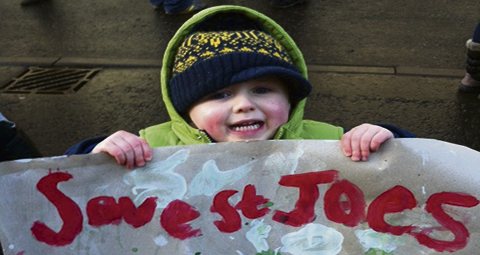September 20 | ![]() 0 COMMENTS
0 COMMENTS ![]() print
print

Draw a line in the sand in Milngavie
Is the proposal to close St Joseph’s Primary School in the town motivated by anti-Catholicism?
By Kevin McKenna
THE future of Catholic education in Scotland may rest on the outcome of an increasingly bitter struggle to save an old primary school in Milngavie. Quite simply it’s a battle that the Church cannot afford to lose. There is too, attached to this case, more than a hint of good, old fashioned anti-Catholic discrimination.
Even a cursory glance at some of the salient facts makes you wonder why the axe is ready to fall on St Joseph’s Primary in Milngavie, one of the oldest established Catholic schools in the west of Scotland. It was founded in 1873 and has existed on its current site for more than 50 years. Local people—both Catholic and non-Catholic alike—are rightly proud of this little jewel and with some justification. It has educated generations of Catholic schoolchildren to a very high standard and is consistently praised by school inspectors for its quality and professionalism.
In recent years St Joseph’s has been playing a vital and dynamic role in the heart of the wider community in Milngavie as its facilities are deployed daily from dawn to dusk as a nursery and a timeout club. The nursery is a non-denominational one while the timeout club provides care for children before school and after school, thereby adding a degree of flexibility to many families who need both incomes. The Tuesday club provides support in a loving environment for adults with learning difficulties. In delivering all of this St Joseph’s is an outstanding example of what a dynamic Christian community can achieve in modern Scotland. All of these resources would be adversely affected if St Joseph’s were to close. Such though, is the preferred option of East Dunbartonshire Council.
At the end of March the council commenced a formal consultation on the closure of St Joseph’s. This would involve the relocation of its children to a new-build at St Andrews in nearby Bearsden. In front of a dozen or so parents, one local politician stated that this would keep ‘all the Catholics’ together. Quite why this individual thought it was desirable to have ‘all the Catholics’ in one place was left unstated. Perhaps it’s easier to keep an eye on them all. Writing in The Scottish Catholic Observer at the time, Andrew McFadyen stated: “Instead of a local school, they are offering a bus pass.”
There is simply no valid educational reason for closure. The proposed merger with St Andrew’s would entail a two-mile bus journey for the pupils. Currently children often walk to St Joseph’s in the company of a parent or, in many cases, a grandparent and so a key component in the Christian family structure is under threat here.
There are three non-denominational primary schools in Milngavie, yet not one of them is being earmarked for closure in this way. At least one of them is under-capacity to a greater degree than St Joseph’s. Indeed the way that East Dunbartonshire Council calculated the capacity of St Joseph’s is deeply unfair. The stated school roll is 127, a figure which the school board states, is simply false. The council has also factored in an outbuilding used by the timeout club as a classroom to deepen the impression of under-capacity.
When the council first issued a consultation to the changes proposed in the provision of primary school education in the area the percentage of responses from the St Joseph’s parents was 96 per cent, the highest percentage of any of the schools in the area. Each of the replies stated how important it was that 140 years of Catholic education in the area continued.
It’s difficult to escape the suspicion that St Joseph’s is about to become the victim in a decidedly dodgy local authority stitch-up with a stench of anti-Catholic discrimination. Is St Joseph’s being made to walk the plank because it is small and Catholic, and as such is deemed to be an easy target? Why is the Catholic school in the area being treated differently?
For reasons as yet unknown, the local councillor, Labour’s Maureen Henry, has been about as useful as a chocolate teapot. She has refused to back the campaign by her constituents —something that, hopefully, will come back to haunt her at the next local council elections. The response from the Catholic Church has been muted apart from saying that it desires some form of Catholic primary school education to continue in Milngavie.
If a Catholic school which has provided unbroken excellence in education for the community can be gerrymandered out of existence like this then no Catholic school in Scotland is safe. Aggressive humanism and militant atheism is beginning to place a stranglehold on civic and political life in Scotland. These people will stop at nothing to see every vestige of Christianity wiped out of society. They know that if they can eradicate Catholic state education they will have taken a massive step towards this goal. The fall of St Joseph’s would be celebrated long and loudly by them.
The self-inflicted damage to the Church in recent years has alerted many people and organisations to the possibility that its influence may be ended forever. They will never have a better opportunity to bring down their hated Catholic schools. It is time for the hierarchy to awake and draw a line in the sand of Milngavie.
n Kevin McKenna is former deputy editor of the Herald and former
executive editor of the Daily Mail in Scotland. He is currently a columnist for the Guardian










